- About Us
-
Who we are
-
- Publications
-
- ADPC Academy
-
MediaADPC'S NEWS
Reconnecting with alumni and embracing virtual capacity development Reconnecting with alumni and embracing virtual capacity development
11 Aug 2020
Bangkok, Thailand
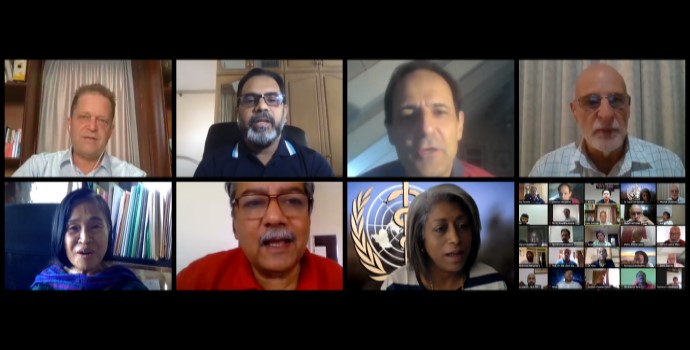
ADPC and World Health Organization (WHO) experts discussing the future of training.
Traditional classrooms and face-to-face learning are becoming a distant memory due to travel uncertainties and physical distancing measures from COVID-19. Instructors and their students are all sharpening their technology skills to embrace remote delivery, online learning and virtual discussions as the way forward.
ADPC through its Academy department organized a virtual alumni forum on ‘Keeping Close Amidst the Distance: Training and Capacity Development in the Era of COVID-19’ to shape global, regional, and national agendas on education through a dialogue-based discussion.
Over 140 ADPC alumni across the world signed in to hear from ADPC and World Health Organization (WHO) experts and ask questions on pandemic-proof methods for e-learning.
Inputs from the forum will also guide ADPC Academy’s initiatives to pursue ‘blended’ learning approaches that combine online and face-to-face learning modules to teach disaster risk reduction and climate resilience subjects.
Mr. Bill Ho, Director at ADPC and Officer in Charge of ADPC Academy, welcomed the participants and explained the proceedings.
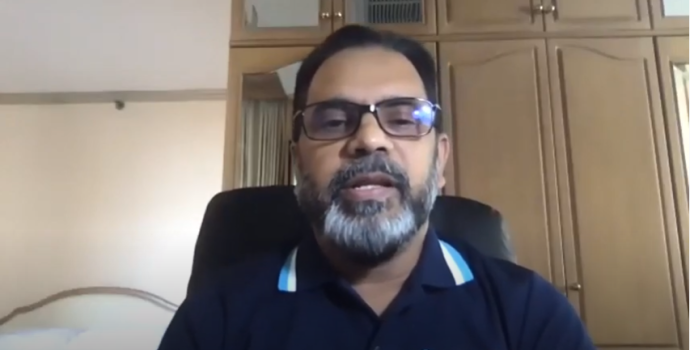
Mr. Aslam Perwaiz, Deputy Executive Director of ADPC, moderating the forum.
Mr. Aslam Perwaiz, Deputy Executive Director of ADPC, served as moderator to the forum. Mr. Perwaiz identified that ADPC Academy’s training has reached over 26 countries across different continents in 34 years and that he was looking forward to insights from alumni.
“The main purpose for this meeting was not really to have training or a lecture session, but rather bringing all of you in one frame,” he said.
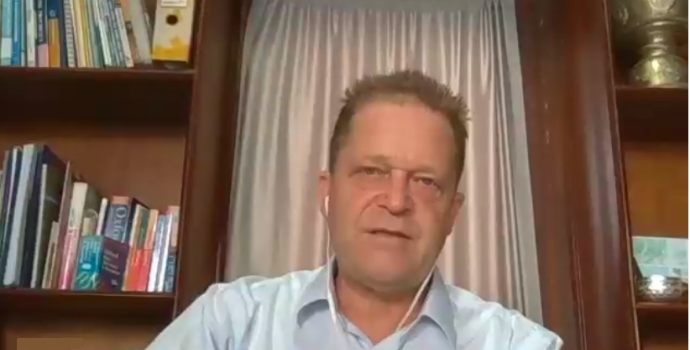
Mr. Hans Guttman, Executive Director of ADPC, addressing participants on ADPC’s future.
Mr. Hans Guttman, Executive Director of ADPC, reflected on ADPC’s adjustments to COVID-19’s new normal. Mr. Guttman explained that training and capacity development remains relevant and conducting online training increases ease of participation.
“I recognize the potential of having you all engaged and it [the forum] will be part of ADPC’s strategy over the next decade to provide greater reach technically and geographically,” he added.

Mr. Jonathan Abrahams, Country Health Emergency Preparedness and International Health Regulations at WHO, discussing health and resilience.
Mr. Jonathan Abrahams, Country Health Emergency Preparedness and International Health Regulations at WHO, spoke about putting health at the center of resilience. “Health is a shared interest, it’s a shared outcome that we are all working to,” he explained.
Mr. Abrahams recommended that ADPC, its alumni and WHO can assist in future evaluations of country responses to COVID-19 and he also commended ADPC’s Public Health and Emergency Management in Asia and the Pacific (PHEMAP) course for its focus on leadership to improve health sector efficiency.
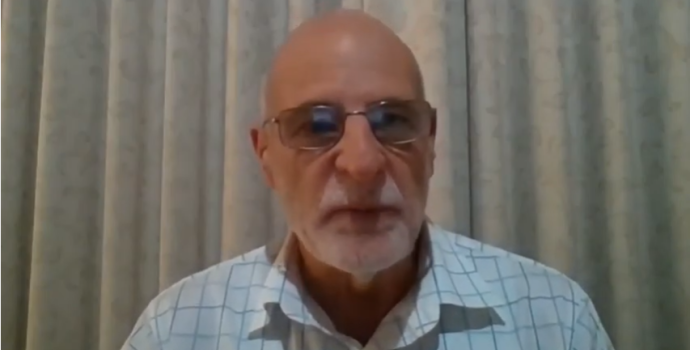
Mr. Merrick Chatfield, former Director at ADPC, sharing insights on e-Learning capacity changes.
Mr. Merrick Chatfield, former Director at ADPC, reviewed the tracking of capacity changes with e-Learning approaches. Mr. Chatfield suggested that COVID-19 is part many ‘new normals’ that the world experiences and e-Learning has to constantly evolve based on different needs and contributions.
Mr. Chatfield also addressed barriers to accessing e-Learning. “We need to recognize that there is a variance in access to technology, but there are also solutions on how we can enable remote communities and low technology communities to actually access some aspects of e-Learning,” he said.
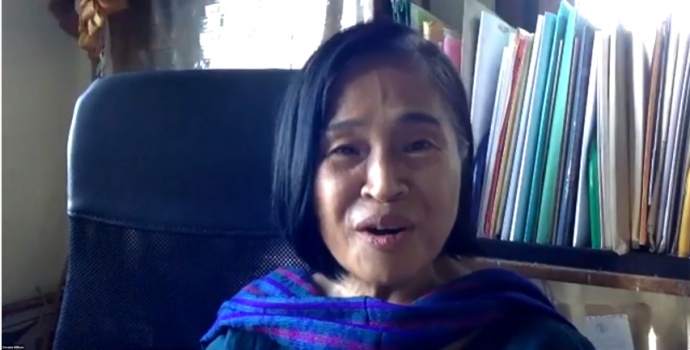
Ms. Zenaida Willison, former Director at ADPC, talking about sustaining community learning.
Ms. Zenaida Willison, former Director at ADPC, shared initiatives to sustain learning communities through and beyond COVID-19. Ms. Willison identified the differences in learning resources and priorities between government and civil society organizations (CSOs) and suggested a bottom-up approach to learning for enhanced localized action.
“The principle of community based disaster risk management is the participation of all, but in this time, in this crisis time, we need to rely on community leaders,” she said.
Ms. Willison also recommended that ADPC can gather local experiences and help develop guidelines for countries to propagate a shared learning system between all stakeholders.
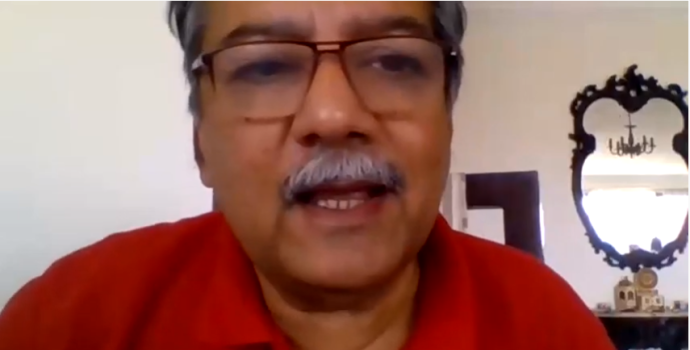
Mr. Loy Rego, former Deputy Executive Director of ADPC, sharing background on ADPC Academy.
Mr. Loy Rego, former Deputy Executive Director of ADPC, explored opportunities for distance learning based on ADPC Academy’s experiences. Mr. Rego shared that over 14,000 alumni attended 183 regional public courses organized by ADPC Academy, which helped establish an active network of alumni working in disaster risk reduction and climate resilience.
“While the pandemic may shake all of us, it has certainly disrupted face-to-face training courses that ADPC used to organize and opened up a new range of possibilities for online work,” he added.
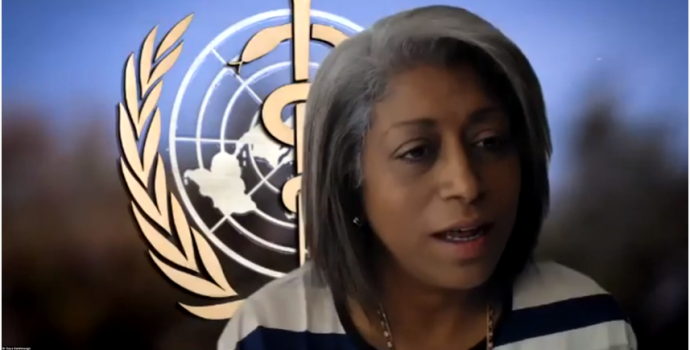
Dr. Gaya Gamhewage, Head of Learning and Capacity Building at WHO, discussing effective learning methods.
Dr. Gaya Gamhewage, Head of Learning and Capacity Building at WHO, spoke about effective learning during COVID-19 and designing the upcoming WHO Academy. Dr. Gamhewage identified that the OpenWHO platform offers 13 online courses on COVID-19 in 38 languages as well as low bandwidth/offline versions to increase content access and retention.
Dr. Gamhewage also stated that WHO is working with the International Telecommunications Union (ITU) to improve teacher and learner digital skills. “We really have to have a higher level of facilitation skills in the teachers and a higher level of learning skills in the learners and the peers,” she said.
ADPC alumni representing government, international organizations, CSOs, and academia were invited to ask questions and share their inputs on improve e-Learning in their sectors. Key issues raised include reducing the duration of online training and introducing more self-paced options so that learners can balance the course with their office duties.
Mr. Guttman invited alumni to explore new technology like virtual reality that enhances learning rather than emulating face-to-face training experiences in e-Learning.
Mr. Perwaiz mentioned technology regulators should be included in e-Learning process and cited ADPC’s work with Sri Lanka’s Information and Communication Technology Agency of Sri Lanka (ICTA) on uploading damage and loss assessment training.
ADPC plans to organize more forums to reconnect further with its alumni and encourage further discussion between forum participants to deliver meaningful course content.
Watch a video of the full forum below:
Latest NewsRelated Trainings
-